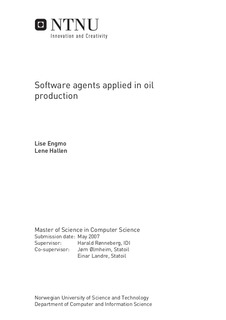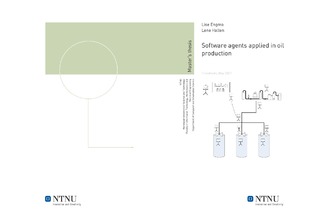| dc.contributor.advisor | Rønneberg, Harald | nb_NO |
| dc.contributor.advisor | Ølmheim, Jørn | nb_NO |
| dc.contributor.advisor | Landre, Einar | nb_NO |
| dc.contributor.author | Engmo, Lise | nb_NO |
| dc.contributor.author | Hallen, Lene | nb_NO |
| dc.date.accessioned | 2014-12-19T13:31:41Z | |
| dc.date.available | 2014-12-19T13:31:41Z | |
| dc.date.created | 2010-09-03 | nb_NO |
| dc.date.issued | 2007 | nb_NO |
| dc.identifier | 347458 | nb_NO |
| dc.identifier | ntnudaim:3368 | nb_NO |
| dc.identifier.uri | http://hdl.handle.net/11250/250440 | |
| dc.description.abstract | The current increase in instrumentation of oil production facilities leads to a higher availability of real-time sensor data. This is an enabler for better control and optimisation of the production, but current computer systems do not necessarily provide enough operator support for handling and utilising this information. It is believed that agent technology may be of use in this scenario, and the goal of this Master's thesis is to implement a proof-of-concept which demonstrates the suitability of such solutions in this domain. The agent system is developed using the Prometheus methodology for the design and the JACK Intelligent Agents framework for the implementation. A regular Java program which simulates the running of a very simplified oil field is also developed. The simulator provides the environment in which the agent system is put to the test. The agents' objective is to maximise the oil production while keeping the system within its envelope. Their performance is compared with results obtained by a human operator working with the same goal in the same environment. The metrics we use are the number of critical situations which occur, their duration, and the total amount of oil produced. The results indicate that the agents react faster to changes in the environment and therefore manage to reduce the amount and duration of critical situations, as well as producing more oil. This suggests a possibility of introducing an agent system to deal with some aspects of the production system control. This may contribute to a reduction of the information load on the operator, giving him/her more time to concentrate on situations which the agents are not able (or not allowed) to handle on their own. | nb_NO |
| dc.language | eng | nb_NO |
| dc.publisher | Institutt for datateknikk og informasjonsvitenskap | nb_NO |
| dc.subject | ntnudaim | no_NO |
| dc.subject | SIF2 datateknikk | no_NO |
| dc.subject | Intelligente systemer | no_NO |
| dc.title | Software agents applied in oil production | nb_NO |
| dc.type | Master thesis | nb_NO |
| dc.source.pagenumber | 130 | nb_NO |
| dc.contributor.department | Norges teknisk-naturvitenskapelige universitet, Fakultet for informasjonsteknologi, matematikk og elektroteknikk, Institutt for datateknikk og informasjonsvitenskap | nb_NO |

